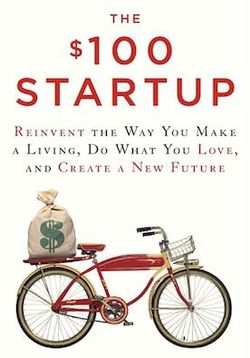I decided to follow-up the last WorkPuzzle I wrote on the importance of entrepreneurism in the hiring of “new to real estate” agents… For young people, I believe this is a particularly healthy framework from which to approach a real estate career. 
Why? Because starting a business captures a unique balance between an individual’s hope for the future and the expectation that to pursue that hope, he/she will most likely need to follow a path that is long and difficult.
Approaching a real estate career from a traditional job perspective is a completely different proposition. The job framework may cause people to expect quick payoffs and become discouraged when they do not materialize.
In relation to this topic, I recently came across an interview conducted by a writer from Nashville named Jeff Goins. The interview is with Chris Guillebeau, author of a new book called The $100 Startup.
This interview (and the book as well) peaked my interest because it documents the stories of hundreds of individuals who were willing to step out and start a business. Here is part of the interview:
Jeff: What’s the $100 Startup about, and why is it needed?
Chris: Two things: first, it’s the collective story of 1,500 “unexpected entrepreneurs” who all started businesses without a lot of money or special skills. Second, it’s a blueprint for readers who want to create their own freedom by doing something they love.
It’s needed because people are dissatisfied. They want more from life than a soul-sucking job that takes their energy without providing much in return.
People have always been dissatisfied, of course, but they haven’t always known which steps to take to create independence. The book is an attempt at providing 300 pages of next steps.
Jeff: In the book, you tell stories of businesses you’ve seen launched on a bootstrapped budget all around the world. What was one of the most interesting ones?
Chris: The book includes a wide range of stories, from six-figure blogging businesses to retail shops. It’s hard to pick a favorite, but since you’re a writer, I’ll point you to Brett Kelly’s success.
Brett was a self-described geek who wrote the first eBook on Evernote, the free note-taking software. This project earned more than $100,000 in its first year, and allowed Brett and his family to get out of debt.
It’s an incredible success, of course, but in researching the book and talking to people, I heard story after story like Brett’s. It seems that success can indeed be replicated, if you take the right steps.
Jeff: You live your life, traveling the world and supporting yourself online. What is it about this lifestyle that attracts you, and what advice do you have for aspiring entrepreneurs?
Chris: Personally I couldn’t imagine doing it any other way. I’ve been self-employed for nearly 15 years and extensively traveling for 10 years. I love what I do and wouldn’t trade it for anything.
My advice to aspiring entrepreneurs is always focus on value. Value is one of those words that is often used without much definition. My definition is that value simply means “helping people.”
You aren’t likely to succeed as an entrepreneur, digital nomad, or whatever business goal you aspire to without helping people. In other words, you can do what you love, but you must find a way to connect that with other people’s needs.
There are two lines that stand out to me in this interview.
1. "It’s needed because people are dissatisfied. They want more from life than a soul-sucking job that takes their energy without providing much in return."
This is so true. Many of the people that you will interview are languishing in their current jobs. Tap into those feelings of dissatisfaction as you listen to their stories. Attuning youself to their struggles will create attachment. The first step to leaving an existing career is feeling some attachment to something new.
2. "The book is an attempt at providing 300 pages of next steps."
This is where I believe your own creativity will be sparked. When you are interviewing someone you believe will make a great agent, but who faces some obstacles (usually financial challenges), you need to offer a series of small steps that he/she can take towards becoming an agent. Unfortunately, recruiting is not a transaction. It's a process that takes time, focus, and effort to complete.
Here’s some homework for you—get this book and read it. As you read it, jot down notes about some of the stories that would most closely apply to a real estate career. And then, during your next interview, spend a small amount of time selling the idea of becoming an entrepreneur. As we learned last week, those candidates who light up when presented with this idea, just may have the real estate gene.
 Editor's Note: This article was written by Ben Hess. Ben is the Founding Partner and Managing Director of Tidemark, Inc. and a regular contributor to WorkPuzzle. Comments or questions are welcome. If you're an email subscriber, reply to this WorkPuzzle email. If you read the blog directly from the web, you can click the "comments" link below.
Editor's Note: This article was written by Ben Hess. Ben is the Founding Partner and Managing Director of Tidemark, Inc. and a regular contributor to WorkPuzzle. Comments or questions are welcome. If you're an email subscriber, reply to this WorkPuzzle email. If you read the blog directly from the web, you can click the "comments" link below.

